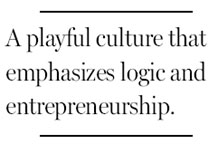Academy in France upends tradition
Updated: 2013-11-24 07:03
By Scott Sayare(The New York Times)
|
|||||||||
PARIS - As its odd name implies, Xavier Niel's new technology academy called 42 does not plan to be conventional.
Mr. Niel, a telecommunications executive with a high school diploma and several billion euros to his name, has spent a decade gleefully disrupting France's staid corporate establishment. With 42, he means to do the same to higher education.
There will be no lectures or teachers, only group projects and "friendly organizers" wearing T-shirts. No state-sanctioned degree will be awarded, nor must students, ages 18 to 30, be high school graduates. Installed in a refurbished administrative building at the edge of Paris, 42 is tuition-free and has sought to attract students from the poorest neighborhoods.
|
The curriculum at 42, a tuition-free academy in Paris, will focus on problem-solving, not rote learning. The director, Nicolas Sadirac. Corentin Fohlen for The New York Times |
In a nod to the playful culture of Silicon Valley, there are plans for a slide between the rooftop deck and the cafeteria.
The school breaks with the often-rigid methods and philosophy of the government education system wherever it can, and Mr. Niel believes it will produce graduates who are more innovative, more employable, more diverse and more useful to the stagnant French economy as a result.
But the French revere their schools system, the Education Nationale. And 42, where programming classes were starting this month, has proved a minor scandal here.
Its very name is a cryptic provocation, coming from "The Hitchhiker's Guide to the Galaxy," the novel by Douglas Adams that is a favorite of technology types here, in which the number 42 is proclaimed the "Answer to the Ultimate Question of Life, the Universe and Everything."
"People say to us, 'But why didn't you see about working with the Education Nationale?'" said Mr. Niel, who has put up 70 million euros, or about $94 million, for 42's first decade of operations. "Well," he said, "do you want this thing to work or not?"
The Ministry of Higher Education declined to comment on the new academy. But public officials acknowledge that existing institutions are failing to train students in skills that are in demand. Despite a national jobless rate of nearly 11 percent, as many as 60,000 computer coding jobs are thought to be vacant in France, the government says, for lack of qualified candidates.

The new academy promotes what many French call the Anglo-Saxon virtues of entrepreneurship and creative thinking, Mr. Niel said, whereas the standard French approach relies heavily on rote learning.
"In France, there are always excellent engineers - the Germans recruit them," said Nicolas Baverez of the Institut Montaigne, a nonpartisan think tank. But 42 marks "the French educational system's inability to address innovation, upward social movement, the emergence of new technologies and sectors," he said.
Typically, French students learn specific rules for specific situations, said Nicolas Sadirac, 42's director. "The problem is that for inventing stuff," he said, "that's a catastrophe."
Of the 20,000 applicants, 900 were admitted to the three-year program that will teach problem solving, its creators say.
Marc Neveu, a professor of computing who heads Snesup, France's largest union of university educators, said 42 might be shortsighted. Graduates will surely prove gifted code-writers, Mr. Neveu said, but may find themselves restricted to an "extremely precise niche" that may not always exist.
Still, some public officials have welcomed it.
"We need to grow more culturally accustomed to seeing private initiatives being born," said Fleur Pellerin, the government's minister for small businesses and the digital sector.
"There's an enormous need for qualified, trained people," Ms. Pellerin said, and 42 "corresponds exactly" with "the way we need to be training young people today for the digital economy."
The New York Times
(China Daily 11/24/2013 page10)
